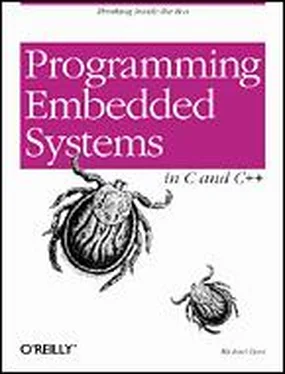Table lookups
A switch statement is one common programming technique to be used with care. Each test and jump that makes up the machine language implementation uses up valuable processor time simply deciding what work should be done next. To speed things up, try to put the individual cases in order by their relative frequency of occurrence. In other words, put the most likely cases first and the least likely cases last. This will reduce the average execution time, though it will not improve at all upon the worst-case time.
If there is a lot of work to be done within each case, it might be more efficient to replace the entire switch statement with a table of pointers to functions. For example, the following block of code is a candidate for this improvement:
enum NodeType { NodeA, NodeB, NodeC };
switch (getNodeType()) {
case NodeA:
.
.
case NodeB:
.
.
case NodeC:
.
.
}
To speed things up, we would replace this switch statement with the following alternative. The first part of this is the setup: the creation of an array of function pointers. The second part is a one-line replacement for the switch statement that executes more efficiently.
int processNodeA(void);
int processNodeB(void);
int processNodeC(void);
/*
* Establishment of a table of pointers to functions.
*/
int (* nodeFunctions[])() = { processNodeA, processNodeB, processNodeC };
.
.
/*
* The entire switch statement is replaced by the next line.
*/
status = nodeFunctions[getNodeType()]();
Hand-coded assembly
Some software modules are best written in assembly language. This gives the programmer an opportunity to make them as efficient as possible. Though most C/C++ compilers produce much better machine code than the average programmer, a good programmer can still do better than the average compiler for a given function. For example, early in my career I implemented a digital filtering algorithm in C and targeted it to a TI TMS320C30 DSP. The compiler we had back then was either unaware or unable to take advantage of a special instruction that performed exactly the mathematical operations I needed. By manually replacing one loop of the C program with inline assembly instructions that did the same thing, I was able to decrease the overall computation time by more than a factor of ten.
Register variables
The keyword register can be used when declaring local variables. This asks the compiler to place the variable into a general-purpose register, rather than on the stack. Used judiciously, this technique provides hints to the compiler about the most frequently accessed variables and will somewhat enhance the performance of the function. The more frequently the function is called, the more likely such a change is to improve the code's performance.
Global variables
It is more efficient to use a global variable than to pass a parameter to a function. This eliminates the need to push the parameter onto the stack before the function call and pop it back off once the function is completed. In fact, the most efficient implementation of any subroutine would have no parameters at all. However, the decision to use a global variable can also have some negative effects on the program. The software engineering community generally discourages the use of global variables, in an effort to promote the goals of modularity and reentrancy, which are also important considerations.
Polling
Interrupt service routines are often used to improve program efficiency. However, there are some rare cases in which the overhead associated with the interrupts actually causes an inefficiency. These are cases in which the average time between interrupts is of the same order of magnitude as the interrupt latency. In such cases it might be better to use polling to communicate with the hardware device. Of course, this too leads to a less modular software design.
Fixed-point arithmetic
Unless your target platform includes a floating-point coprocessor, you'll pay a very large penalty for manipulating float data in your program. The compiler-supplied floating-point library contains a set of software subroutines that emulate the instruction set of a floating-point coprocessor. Many of these functions take a long time to execute relative to their integer counterparts and also might not be reentrant.
If you are only using floating-point for a few calculations, it might be better to reimplement the calculations themselves using fixed-point arithmetic only. Although it might be difficult to see just how this can be done, it is theoretically possible to perform any floating-point calculation with fixed-point arithmetic. (After all, that's how the floating-point software library does it, right?) Your biggest advantage is that you probably don't need to implement the entire IEEE 754 standard just to perform one or two calculations. If you do need that kind of complete functionality, stick with the compiler's floating-point library and look for other ways to speed up your program.
10.2 Decreasing Code Size
As I said earlier, when it comes to reducing code size your best bet is to let the compiler do the work for you. However, if the resulting program is still too large for your available ROM, there are several programming techniques you can use to further reduce the size of your program. In this section we'll discuss both automatic and manual code size optimizations.
Of course, Murphy's Law dictates that the first time you enable the compiler's optimization feature your previously working program will suddenly fail. Perhaps the most notorious of the automatic optimizations is "dead code elimination". This optimization eliminates code that the compiler believes to be either redundant or irrelevant. For example, adding zero to a variable requires no runtime calculation whatsoever. But you might still want the compiler to generate those "irrelevant" instructions if they perform some function that the compiler doesn't know about.
For example, given the following block of code, most optimizing compilers would remove the first statement because the value of *pControl is not used before it is overwritten (on the third line):
*pControl = DISABLE;
*pData = 'a';
*pControl = ENABLE;
But what if pControl and pData are actually pointers to memory-mapped device registers? In that case, the peripheral device would not receive the DISABLE command before the byte of data was written. This could potentially wreak havoc on all future interactions between the processor and this peripheral. To protect yourself from such problems, you must declare all pointers to memory-mapped registers and global variables that are shared between threads (or a thread and an ISR) with the keyword volatile . And if you miss just one of them, Murphy's Law will come back to haunt you in the final days of your project. I guarantee it.
Never make the mistake of assuming that the optimized program will behave the same as the unoptimized one. You must completely retest your software at each new optimization level to be sure its behavior hasn't changed.
To make matters worse, debugging an optimized program is challenging, to say the least. With the compiler's optimization enabled, the correlation between a line of source code and the set of processor instructions that implements that line is much weaker. Those particular instructions might have moved or been split up, or two similar code blocks might now share a common implementation. In fact, some lines of the high-level language program might have been removed from the program altogether (as they were in the previous example)! As a result, you might be unable to set a breakpoint on a particular line of the program or examine the value of a variable of interest.
Читать дальше












